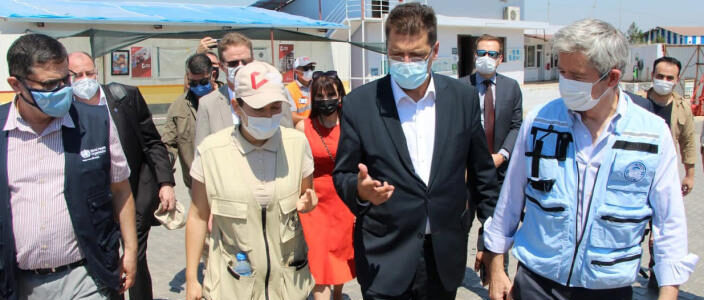
Western nations headed to a likely Friday showdown with Russia over the delivery of humanitarian aid from Turkey to rebel-held northwest Syria, where the U.N. says 3.4 million people are in desperate need of food and other assistance while the current mandate for cross-border deliveries expires Saturday.
The key issue is whether the U.N. Security Council should authorize deliveries through the Bab al-Hawa crossing for another year as the West, U.N. and humanitarian groups want or for just six months as Russia, Syria’s closest ally, is insisting on.

The council is expected to vote Friday, and Russia’s U.N. ambassador, Vassily Nebenzia, told reporters Thursday that “12 months doesn’t fly.”
Norway and Ireland have put up for a vote their draft resolution that would authorize a one-year extension of deliveries through Bab al-Hawa to Syria’s Idlib region. They say a year’s extension is essential to ensure the flow of aid, while six months would require another vote in January and could potentially leave millions of Syrians without aid in the middle of winter.

Russia circulated a rival resolution Thursday that would authorize a six-month extension “with the anticipation of renewal” subject to a report from U.N. Secretary-General Antonio Guterres on “transparency” in aid deliveries and progress on sending aid directly across conflict lines within Syria.
Nebenzia told the Security Council two weeks ago that aid moving across conflict lines “is the only legitimate option for a humanitarian operation to deliver assistance.” He accused Western nations of wasting the past year that could have been used “to find a seamless and constructive solution and an optimal balance of Idlib’s procurement through both Bab al-Hawa and domestic channels.”
He also claimed that some aid was going to Hayat Tahrir al-Sham, the strongest militant group in Idlib, and not to needy Syrians. He demanded greater transparency in the cross-border operation.
Nebenzia was asked why Russia agreed to a one-year extension last year but is opposed this year.
“We did accept one year last year. Nothing was happening. Nothing was happening. We’re offering more or less the same, so it’s now for the other side to decide,” he said. “Whatever happens, there is a decision tomorrow.”
The issue of cross-border aid to Syria was taken up by U.S. President Joe Biden at his summit with Russian President Vladimir Putin last month and has generated other high-level interventions aimed at keeping at least Bab al-Hawa operating.
The Security Council approved four border crossings when aid deliveries began in 2014, three years after the start of the Syrian conflict. But in January 2020, Russia used its veto threat in the council first to limit aid deliveries to two border crossings in the northwest, and then last July to cut the crossings to just Bab al-Hawa.
Ireland and Norway initially proposed to also reopen the Al-Yaroubiya border crossing from Iraq to Syria’s mainly Kurdish-controlled northeast. But last week, Nebenzia called that idea “a non-starter,” so Norway and Ireland revised their proposal to just keeping the Bab al-Hawa crossing open.
Acting U.N. humanitarian chief Ramesh Rajasingham told the Security Council in late June that a failure to extend the mandate for Bab al-Hawa “would disrupt lifesaving aid to 3.4 million people in need across the northwest, millions of whom are among the most vulnerable in Syria.”
Credit: Rt News
